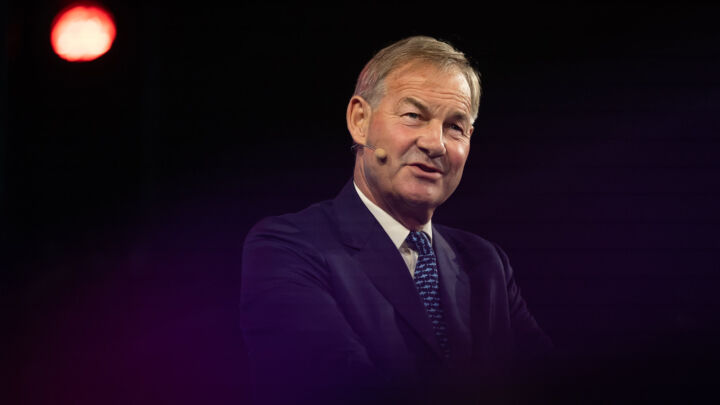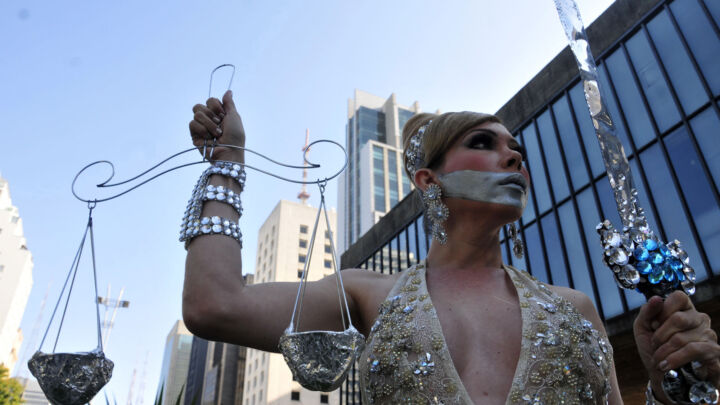The right to criticise George Soros
This arrogant and destructive oligarch must be held to account.

Want unlimited, ad-free access? Become a spiked supporter.
Anyone who dares to criticise the billionaire speculator George Soros can expect to be denounced as an anti-Semite. So last week, when Roger Scruton spoke unkindly about Soros in an interview with the New Statesman, it was inevitable that sections of the media would brand him a xenophobic villain. Scruton referred to a ‘Soros Empire’ in Hungary and this was immediately seized upon as evidence of his anti-Semitism. George Eaton, who carried out the interview, tweeted that, ‘There is no context in which it is OK to refer to a “Soros empire” (an anti-Semitic trope)’.
There was a time when criticism of Soros was not automatically condemned as a form of secular heresy. Some in the media were more than willing to draw attention to Soros’s parasitic behaviour as a ruthless speculator who seemed indifferent to the destructive impact of his actions on other people’s lives. Even the New Statesman was prepared to question Soros’s imperial ambitions and to question this oligarch’s motives. Indeed, Scruton’s reference to a ‘Soros Empire’ in Hungary comes across as positively restrained in comparison with the wording in a 2003 New Statesman profile of Soros.
That profile drew attention to the who’s who of the American military-industrial complex who made up the boards of the numerous NGOs funded by Soros. It pointed out that Soros’s International Crisis Group included such ‘non-governmental’ personalities as former US national security adviser Zbigniew Brzezinski and General Wesley Clark, a former NATO supreme allied commander for Europe. The NS profile said it ‘cannot be seriously’ doubted that Soros’s ‘companies and NGOs are closely wrapped up in US expansionism’. ‘For years’, it continued, ‘Soros and his NGOs have gone about their work extending the boundaries of the “free world”’.
Then there was Soros’s fondness for supporting regime change. ‘Armed with a few billion dollars, a handful of NGOs and a nod and a wink from the US State Department, it is perfectly possible to topple foreign governments that are bad for business, seize a country’s assets, and even to get thanked for your benevolence afterwards’, said the 2003 NS profile of Soros.
And Soros was already hard at work in Hungary, as the NS profile pointed out: ‘In 1984, he founded his first Open Society Institute in Hungary and pumped millions of dollars into opposition movements and independent media. Ostensibly aimed at building up a “civil society”, these initiatives were designed to weaken the existing political structures and pave the way for Eastern Europe’s eventual colonisation by global capital.’ The Independent went even further than the New Statesman. In 1998 it referred to Soros as ‘God of all he surveys’.
Back in 2003, clearly the New Statesman was not in the business of instructing the public on what you could and couldn’t say about Soros. It was still possible then to criticise Soros’s imperial ambition without facing the charge of anti-Semitism. Soros hadn’t yet been claimed as a sacred figure. Sixteen years later and things could not be more different. Soros is now treated as a male version of Mother Theresa. Last year the Financial Times chose him as its ‘Person of the Year’ and, without irony, characterised him as the ‘standard bearer for liberal democracy’.
So what has changed? Why has the political establishment become so devoted to Soros and the idea that he is some kind of secular saint? What has changed is this: much of the Western political establishment and its supporters in the media have become acutely aware of the erosion of their authority and legitimacy. The context for the media vilification of Roger Scruton, and of anyone who criticises Soros, is the raging culture war. In this conflict, the values promoted by the political and cultural establishment are being openly challenged by what they contemptuously dismiss as the forces of populism. Their fear of populism has led them to take a hard line towards anyone who questions their moral or political authority. And in this climate, Soros becomes a kind of anti-populist hero whose reputation needs to be affirmed and celebrated, and whose critics must be damned.
The recent popular rejection of the technocratic style of governance embodied in the EU has forced a hitherto complacent political class on to the defensive. They rightly regard Soros as one of their own and believe that any criticism aimed at this valiant ‘standard bearer for liberal democracy’ is an attack on their legitimacy. That is why Scruton, the very minute he talked about Soros’s imperial ambition, had to be demonised.
In the past, Soros was quite open about his craving for fame and power. He once said: ‘I have always harboured an exaggerated view of my self-importance.’ ‘To put it bluntly’, he said, ‘I fancied myself as some kind of god or an economic reformer like Keynes, or, even better, like Einstein’. Soros clearly enjoys playing God and believes that he doesn’t have to shoulder much responsibility for the destructive consequences of his actions. Indeed, when confronted with the devastating results of his currency speculation on Far Eastern economies in 1997, he replied: ‘As a market participant, I don’t need to be concerned with the consequences of my actions.’
Soros remains an avid empire-builder. I am not sure whether Scruton is entirely accurate to refer to a ‘Soros Empire’ in Hungary – but if it doesn’t exist, it is not for a lack of trying. During my conversations with Hungarian intellectuals in the 1990s, many of them would allude to the fact that Soros came to their country in the early 1980s to ‘go shopping for intellectuals and public figures’. Many of them acknowledged that they were happy to receive funding from Soros because there was no obvious alternative source of finance. Through his activities, Soros successfully established a powerful influence over Hungarian public life.
Rich people are fully entitled to play an active role in public affairs. However, there is something morally wrong when a single individual uses his wealth to influence the political culture of a society. Such behaviour is particularly immoral when an oligarch is able to exercise power over a society he is not a part of. It seems clear to me that the NGOs that Soros funded and supported in Hungary swiftly became a vehicle for his neocolonial project. This project was welcomed by many Hungarian intellectuals and other public figures. ‘Few people have done to Budapest what George Soros has’, enthused Gábor Demszky, a former mayor of Hungary. Soros has contributed to some huge ‘structural and mental changes in the capital city and Hungary itself’, said Demszky.
I want to conclude on a personal note. In 2013, I was invited to speak at an event funded by one of Soros’s foundations in Budapest: the Open Society Youth Exchange. There were many Soros-funded NGO activists in attendance, from various parts of the former Soviet Republics and Eastern Europe. During a lunch at a Budapest hotel, I came face to face with the imperial ambition driving the Soros network. I listened to Dutch, American, British, Ukrainian and Hungarian supporters of Soros’s NGOs brag about their accomplishments. Some claimed they played a major role in the Arab Spring in Egypt. Others voiced their pride in their contribution to the democratisation of Ukraine. Some crowed about their contribution to the overthrow of the Gaddafi regime in Libya.
I sat quietly and felt uncomfortable with these people who so casually assumed that they had the right to play God around the world. At one point, the head of the table – a Hungarian leader of one of Soros’s NGOs – asked me what I thought of their work. I replied that I wasn’t certain whether their imposition of their idea of democracy on the people of Libya was legitimate, or that it would work. Without hesitation my interlocutor rounded on me with the words: ‘I don’t think that we have the luxury of waiting until the Libyan people find their own Jefferson!’
To this day I remember the haughty tone with which she lectured me about how Soros-funded NGOs served as the functional equivalent of Thomas Jefferson for people around the world. I was utterly shocked by the arrogance. I am not sure how much they were exaggerating their role in the destabilisation of the Gaddafi regime. However, the neocolonial, anti-democratic arrogance they displayed towards the people of Libya will stay in my mind – it is not dissimilar to the broader Soros network’s view of European voters today as a populist rabble.
As for the tactic of discrediting critics of Soros with the charge of anti-Semitism – many people who claim that the use of the term ‘Soros Empire’ is anti-Semitic would not bat an eye if someone were to talk about a Jewish lobby dominating American congress. Their concern about anti-Semitism is a highly selective one. This weaponisation of anti-Semitism trivialises a very dangerous prejudice. This baiting of critics of Soros as anti-Jewish undermines the cause of fighting genuine anti-Semitism. Let me assure them that for critics of Soros like myself, the only innocuous feature of George Soros is that he happens to be a Jew.
Scruton, who lost his job as a government adviser for daring to criticise Soros, has learned to his cost that the right to free speech does not apply when you are criticising the ‘standard bearer for liberal democracy’. Shame on a craven Conservative government for its shocking treatment of Scruton. Thankfully, those who are committed to silencing critics of Soros will discover that their censorious behaviour will provoke more and more people to raise questions about this oligarch and his destructive behaviour.
Frank Furedi’s How Fear Works: the Culture of Fear in the 21st Century is published by Bloomsbury Press.
Picture by: Getty.
No paywall. No subscriptions
spiked is free for all
Donate today to keep us fighting
You’ve hit your monthly free article limit.
Support spiked and get unlimited access.
Support spiked and get unlimited access
spiked is funded by readers like you. Only 0.1% of regular readers currently support us. If just 1% did, we could grow our team and step up the fight for free speech and democracy.
Become a spiked supporter and enjoy unlimited, ad-free access, bonus content and exclusive events – while helping to keep independent journalism alive.
Monthly support makes the biggest difference. Thank you.










Comments
Want to join the conversation?
Only spiked supporters and patrons, who donate regularly to us, can comment on our articles.